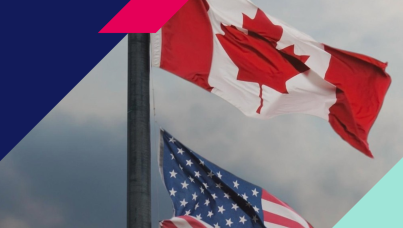Into The Week Of The Budget: The Federal Political Landscape And What Canadians Want Done With The Surplus
Further, a majority (56%) approve of the performance of the Prime Minister over the last while. And while it must also give solace to the Prime Minister and his party that only 38% indicate that Conservative leader Stephen Harper has shown that he is truly ready to be Canada's next Prime Minister, it should be noted that the Federal Liberals won their minority Parliament in the last election with only 37% of the vote.
As for the vote, if one were held tomorrow, the political parties would capture almost identical numbers to what they had at the end of the last election: the Liberals would garner 37% support, followed by the Conservatives at 26%, the NDP at 17%, and the Green Party at 7%. In the province of Quebec, the Bloc Quebecois would capture 39% of the eligible vote followed by the Liberals at 34%, the NDP at 11%, the Conservatives at 8%, and the Green Party at 4%.
It is significant to note that this poll was taken during a week which witnessed the public signing of deal on offshore oil revenues for provinces in Atlantic Canada (with the intended vote in that region bouncing up to favour the Federal Liberals), had the Auditor General's report and saw the commencement of the debate on same-sex marriage.
The momentum for the two major Federal parties also continue to drags: 39% of Canadians believe that their opinion of Mr. Martin has become "worse" since last June's election compared with 29% whose opinion has "improved" (a net -10). As for Mr. Harper, 31% say that their opinion has worsened of him compared with 27% whose opinion has apparently improved (a net -4). The other two major parties leaders have faired better: with 28% of Canadians having an "improved" opinion of Mr. Layton compared with 16% who indicate that their opinion is "worse" (a net +12) and Mr. Duceppe in the Province of Quebec has a very wide margin of momentum - 37% "improved" opinion vs. 15% "worse" (net +22 points) this compares to Prime Minister Martin's momentum in Quebec of a net -23.
But perhaps overarching all of these numbers is the unknown volatility in voters choice on election day when it comes to the issue of same-sex marriage as half (48%) indicate that a party and leader's position will be an important factor in determining how they vote while another half (50%) disagree with this point of view.
As for what Canadians choose the estimated Federal budget surplus of between $11 Billion and $12 Billion to be used for, the ranked ordering of initiatives is as follows: 1."Increase spending on health care" (66%) tops the list of Canadians surplus spending priorities; followed by 2."Increase spending on post-secondary education" (46%); 3."Cut taxes for middle class Canadians" (45%); 4."Reducing the Government of Canada debt" (39%); 5."Create a new national childcare program" (39%); 6."Increase spending on environmental issues such as the cost of implementing the Kyoto Accord" (34%); and 7."Increase spending on Canada's military and national defence" (27%).
These are the findings of an Ipsos-Reid/ CTV/The Globe And Mail poll conducted from February 15th to February 17th, 2004. For the survey, a representative randomly selected sample of 2002 adult Canadians were interviewed by telephone. With a sample of this size, the aggregate results are considered accurate to within 177 2.2 percentage points, 19 times out of 20, of what they would have been had the entire adult Canadian population been polled. The margin of error will be larger within each sub-grouping of the survey population. These data were weighted to ensure the sample's regional and age/sex composition reflects that of the actual Canadian population according to the 2001 Census data. Please open the attached PDF to view the factum and detailed tables.
-30-
For more information on this news release, please contact:
John Wright
Senior Vice-President
Ipsos-Reid Public Affairs
(416) 324-2900



